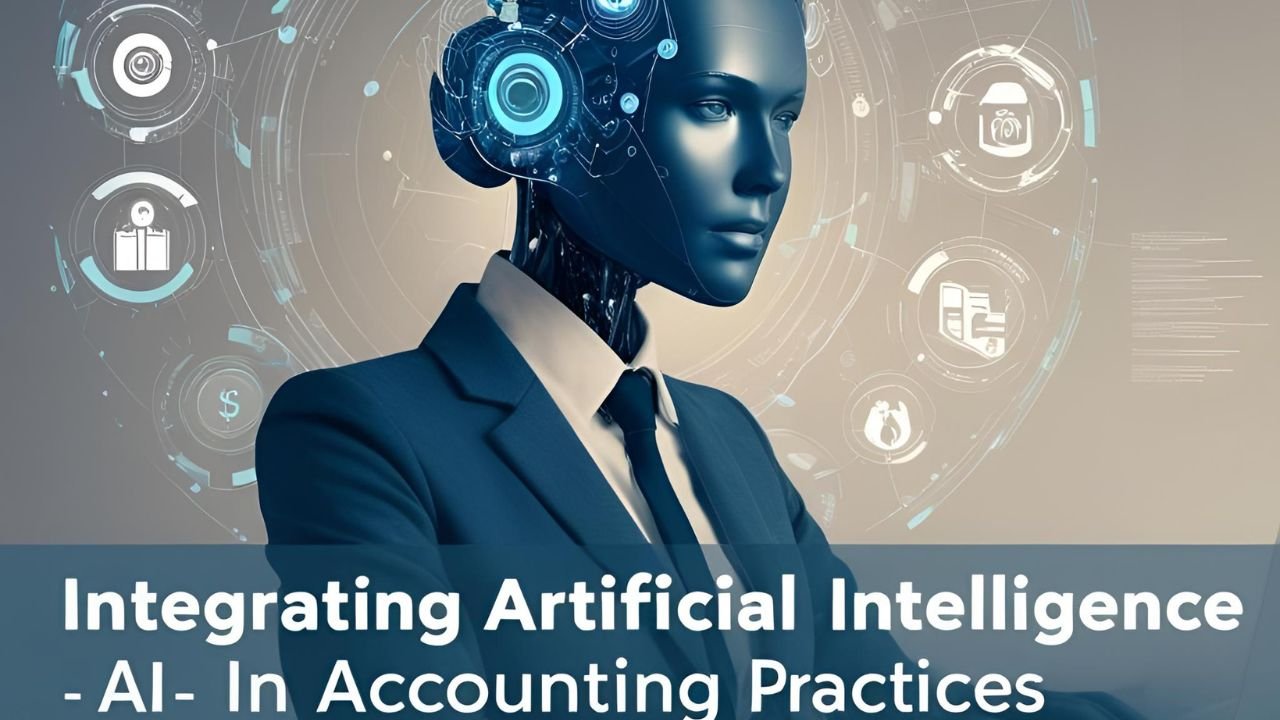Introduction
The integration of Artificial Intelligence AI in accounting practices is revolutionizing the finance industry. AI has the potential to streamline processes, enhance accuracy, and improve decision-making. With the increasing complexity of financial regulations and the need for real-time data analysis, AI-driven accounting solutions are becoming indispensable. This article explores the impact of AI in accounting, its benefits, challenges, and future trends.
The Role of AI in Accounting Practices
AI in accounting refers to the use of machine learning, natural language processing (NLP), robotic process automation (RPA), and other AI technologies to perform and enhance accounting tasks. These technologies help automate repetitive tasks, analyze large datasets, and provide insights that were previously difficult to obtain.
- Automation of Routine Tasks
AI-powered tools can automate mundane and repetitive tasks such as data entry, invoice processing, and reconciliation. This reduces human errors and frees up accountants to focus on more strategic activities.
- Enhanced Data Analysis
AI can analyze massive volumes of financial data quickly and accurately. By recognizing patterns and anomalies, AI can help detect fraud, assess risks, and provide predictive insights for better financial planning.
- Intelligent Decision-Making
AI-driven analytics provide accountants with valuable insights to make informed decisions. Predictive analytics help in forecasting revenue, optimizing cash flow, and identifying potential financial risks before they become critical.
- Improved Compliance and Risk Management
AI-powered audit tools can detect discrepancies and ensure that financial statements adhere to regulatory standards, reducing the risk of penalties.
Benefits of AI in Accounting Practices
The implementation of AI in accounting brings numerous advantages, including:
- Increased Efficiency With AI in Accounting Practices
AI significantly reduces the time required for manual processes, allowing accountants to focus on high-value tasks such as strategy development and financial consulting.
- Reduced Errors and Improved Accuracy
AI minimizes human errors by automating calculations and data entry. Machine learning algorithms improve accuracy by continuously learning from past data.
- Cost Savings With AI in Accounting Practices
Automating accounting processes reduces labor costs and operational expenses. Businesses can optimize resource allocation and improve overall profitability.
- Better Fraud Detection With AI in Accounting Practices
AI systems can analyze transactional data in real-time to identify unusual activities and potential fraud. This enhances financial security and prevents financial losses.
- Scalability With AI in Accounting Practices
AI allows businesses to scale their accounting operations without the need for a proportional increase in workforce. AI-driven cloud accounting solutions enable remote access and collaboration across global teams.
Challenges of AI in Accounting Practices
- High Implementation Costs
The initial investment in AI infrastructure and software can be expensive for small and medium-sized enterprises (SMEs).
- Data Security and Privacy Concerns
AI systems process vast amounts of sensitive financial data, making them vulnerable to cyber threats. Ensuring robust data security measures is crucial.
- Lack of AI Expertise
Many accounting professionals lack the technical skills to implement and manage AI-powered tools. Continuous training and education are necessary.
- Regulatory and Ethical Concerns
The use of AI in accounting raises questions about transparency, accountability, and compliance with financial regulations. Businesses must ensure that AI-driven decisions are ethical and align with legal standards.
Future Trends of AI in Accounting Practices
The future of AI in accounting looks promising, with advancements expected in the following areas:
- AI-Driven Auditing
AI will play a crucial role in automating audit processes, detecting anomalies, and ensuring compliance with financial regulations.
- Blockchain Integration
AI combined with blockchain technology will enhance transaction security, reduce fraud, and improve the transparency of financial records.
- Natural Language Processing (NLP) for Financial Reporting
NLP will enable AI to generate detailed financial reports, interpret legal documents, and assist in tax filings with minimal human intervention.
- AI-Powered Chatbots for Financial Assistance
AI chatbots will provide real-time financial guidance to businesses and individuals, helping them manage expenses and investments effectively.
The Impact of AI on Modern Accounting Practices
Artificial Intelligence (AI) is revolutionizing accounting by enhancing accuracy, automating repetitive tasks, and enabling better financial decision-making. By integrating AI into accounting processes, businesses can improve efficiency, reduce errors, and focus on strategic financial planning. This article explores how AI is reshaping accounting and why its adoption is crucial for modern businesses.
Improving Accuracy and Minimizing Errors With AI in Accounting Practices
Accuracy is fundamental in accounting, and even minor errors can lead to financial complications. Manual bookkeeping often results in mistakes, but AI-powered tools help eliminate these by automating data entry and reconciliation. Machine learning algorithms detect inconsistencies, ensuring more reliable financial records.
Automation of Routine Accounting Tasks With AI in Accounting Practices
AI automates repetitive tasks such as payroll management, invoicing, and transaction categorization. This allows accountants to shift their focus to higher-level activities like financial strategy and analysis.
Enhancing Fraud Detection and Risk Management With AI in Accounting Practices
AI plays a significant role in identifying fraudulent transactions and mitigating financial risks. By analyzing patterns in financial data, AI can detect anomalies and generate real-time alerts. This proactive approach enhances security and helps businesses maintain compliance with regulatory requirements.
Optimizing Decision-Making Through AI Analytics
AI-driven analytics provide valuable insights that help businesses make informed financial decisions. By examining historical trends and market data, AI enables companies to create accurate financial forecasts. These insights support better budgeting, investment planning, and resource allocation.
Ensuring Compliance and Simplifying Tax Processes With AI in Accounting Practices
Keeping up with changing tax laws and financial regulations is challenging. AI-powered accounting software ensures compliance by automating tax calculations and regulatory checks. This reduces the risk of penalties and simplifies the auditing process, making financial management more transparent.
Enhancing Client Services in Accounting With AI in Accounting Practices
AI-powered chatbots and virtual assistants help accountants provide better client support by answering queries and offering financial insights in real-time. This automation improves customer satisfaction and allows professionals to focus on complex client needs.
Reducing Costs and Supporting Business Scalability With AI in Accounting Practices
AI-powered accounting solutions reduce operational costs by minimizing the need for manual intervention. Small and medium-sized businesses benefit from AI-driven financial management tools that optimize efficiency while keeping costs low. Additionally, AI enables companies to scale their financial operations seamlessly.
Conclusion AI in Accounting Practices
AI is transforming the accounting industry by improving accuracy, streamlining operations, detecting fraud, and providing actionable insights for better decision-making. As AI continues to advance, its role in financial management will become even more critical. Businesses that embrace AI-driven accounting solutions will benefit from enhanced efficiency, accuracy, and long-term financial success. Artificial Intelligence is reshaping the accounting industry by enhancing efficiency, accuracy, and decision-making. While challenges exist, businesses that embrace AI-driven accounting solutions will gain a competitive advantage in the evolving financial landscape. As AI technology continues to evolve, its role in accounting will expand, making financial management smarter, faster, and more reliable.

